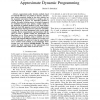49 search results - page 4 / 10 » Temporal Difference and Policy Search Methods for Reinforcem... |
ATAL
2008
Springer
13 years 9 months ago
2008
Springer
In reinforcement learning, least-squares temporal difference methods (e.g., LSTD and LSPI) are effective, data-efficient techniques for policy evaluation and control with linear v...
ICML
2003
IEEE
14 years 22 days ago
2003
IEEE
Reinforcement learning has been used for training game playing agents. The value function for a complex game must be approximated with a continuous function because the number of ...
CDC
2010
IEEE
13 years 2 months ago
2010
IEEE
Approximate policy iteration methods based on temporal differences are popular in practice, and have been tested extensively, dating to the early nineties, but the associated conve...
ICML
2010
IEEE
13 years 5 months ago
2010
IEEE
Temporal difference (TD) algorithms are attractive for reinforcement learning due to their ease-of-implementation and use of "bootstrapped" return estimates to make effi...
CORR
2010
Springer
13 years 6 months ago
2010
Springer
We propose a new approach to value function approximation which combines linear temporal difference reinforcement learning with subspace identification. In practical applications...

